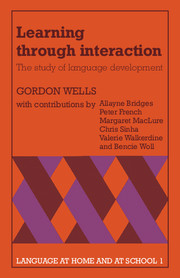Book contents
- Frontmatter
- Contents
- Acknowledgments
- Introduction
- 1 Language as interaction
- 2 Becoming a communicator
- 3 The development of comprehension
- 4 Context, meaning and strategy in parent–child conversation
- 5 Developing linguistic strategies in young school children
- 6 A comparison of talk at home and at school
- 7 Language, literacy and education
- Appendix Bristol language development study: transcripts
- References
- Index
5 - Developing linguistic strategies in young school children
Published online by Cambridge University Press: 05 June 2012
- Frontmatter
- Contents
- Acknowledgments
- Introduction
- 1 Language as interaction
- 2 Becoming a communicator
- 3 The development of comprehension
- 4 Context, meaning and strategy in parent–child conversation
- 5 Developing linguistic strategies in young school children
- 6 A comparison of talk at home and at school
- 7 Language, literacy and education
- Appendix Bristol language development study: transcripts
- References
- Index
Summary
Introduction
In recent years considerable attention has been paid to the way in which the primary school might foster the linguistic and cognitive development of young children. In this chapter we shall examine the assumptions on which such a view of ‘aiding development’ is based, in the light of work carried out in Bristol and by a group of practising teachers engaged on small-scale research projects.
Very often, language and cognition are seen in terms of ‘skills’, ‘concepts’, ‘operations’, and so forth, which the children can be led to practise in the classroom. In such models, the content of the task is usually taken to be irrelevant, as long as the task is seen to embody the generalisable skills or operations it was designed to foster. We would suggest that there are serious problems with such an approach, which separates the process of enquiring, discussing, remembering, etc. from the content and context for and in which the skill or operation takes place. We want to show in this chapter that the way children make sense of the context around them is crucial to an understanding of their performance in school.
Let us begin by recalling some of the recent work on the development of very young children described in earlier chapters. The lesson of this work will be that children make sense of their surroundings by generating categories which are meaningful, yet, because they differ from our own, we adults often fail to recognise their meaning.
- Type
- Chapter
- Information
- Learning through InteractionThe Study of Language Development, pp. 183 - 204Publisher: Cambridge University PressPrint publication year: 1981



